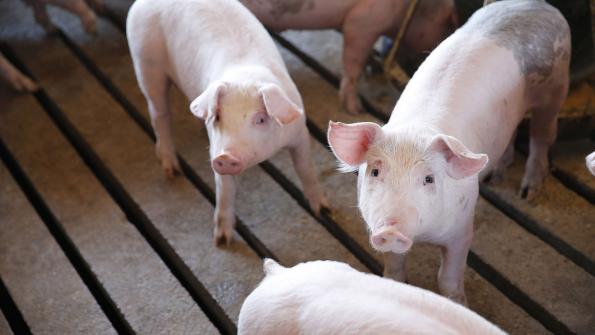UPDATED: NPPC urges Congress to quickly ratify the U.S.-Mexico-Canada trade agreement, which preserves zero-tariff access to markets that represent more than 30% of total U.S. pork exports.
May 23, 2019

The Trump administration today announces a trade relief package in response to the U.S. trade dispute with China. USDA’s trade retaliation relief program includes direct payments to qualifying pork producers, pork surplus purchases for the benefit of low-income families and others in need, and additional funding to develop new export opportunities. The amount of farmer payments and commodity purchases will be announced at a later date.
“We thank President Trump for recognizing that our patriot farmers have borne the brunt of China’s trade retaliation,” says David Herring, a pork producer from Lillington, N.C., and president of the National Pork Producers Council. “The U.S. pork industry has been one of the most adversely affected sectors, receiving a one-two punch in the form of a 50% punitive tariff from China on top of the existing 12% duty and, until recently, a 20% punitive tariff from Mexico. This trade aid will help repair some of the damage inflicted upon U.S. pork producers.”
In addition to Herring, two other NPPC members — Minnesota producer Randy Spronk and Illinois producer Phil Borgic — joined President Trump and USDA Secretary Perdue for the White House announcement.
“It was an honor to attend this event and represent U.S. pork producers, who have been significantly harmed by China’s unfair trade retaliation,” Herring says. “We thank President Trump and USDA Secretary Perdue for standing up for U.S. agriculture, restoring zero-tariff trade with Mexico and providing support for American farmers.”
Herring adds, “The current situation in China represents a historic sales opportunity for U.S. pork. The world’s largest pork-consuming nation is currently experiencing a dramatic reduction in domestic supply because of an animal disease that has ravaged its national swine herd. We look forward to continued work with the administration to restore favorable access to China, allowing U.S. pork producers to capitalize on this opportunity, reduce our trade deficit with China and deliver enormous benefits to the U.S. economy.”
China is the largest consumer of pork in the world. Its swine herd has been ravaged by African swine fever, significantly reducing domestic production and increasing pork imports. However, U.S. pork producers have been hamstrung by a 50% punitive tariff from China, on top of the existing 12% duty. NPPC is eager for a resolution to the China trade dispute. Absent punitive tariffs, China currently represent an historic sales opportunity for U.S pork producers.
In addition to resolution with the China trade dispute, NPPC urges Congress to quickly ratify the U.S.-Mexico-Canada trade agreement, which preserves zero-tariff access to markets that represent more than 30% of total U.S. pork exports.
NPPC has designated USMCA ratification as a “key vote” and will closely monitor support of the agreement among members of Congress. U.S. pork exports to Mexico and Canada support 16,000 U.S. jobs.
NPPC also urges the administration to quickly complete a trade deal with Japan, the largest value market and the second largest volume market for U.S. pork exports. Japan’s new trade agreements with the European Union and other regions are causing an erosion of U.S. pork market share.
According to Dermot Hayes, an Iowa State University economist, U.S. pork will see exports to Japan grow from $1.6 billion in 2018 to more than $2.2 billion over the next 15 years if the United States quickly gains access on par with international competitors. Hayes reports that U.S. pork shipments to Japan will drop to $349 million if a trade deal on these terms is not quickly reached with Japan.
Source: National Pork Producers Council, which is solely responsible for the information provided, and wholly owns the information. Informa Business Media and all its subsidiaries are not responsible for any of the content contained in this information asset.
About the Author(s)
You May Also Like



